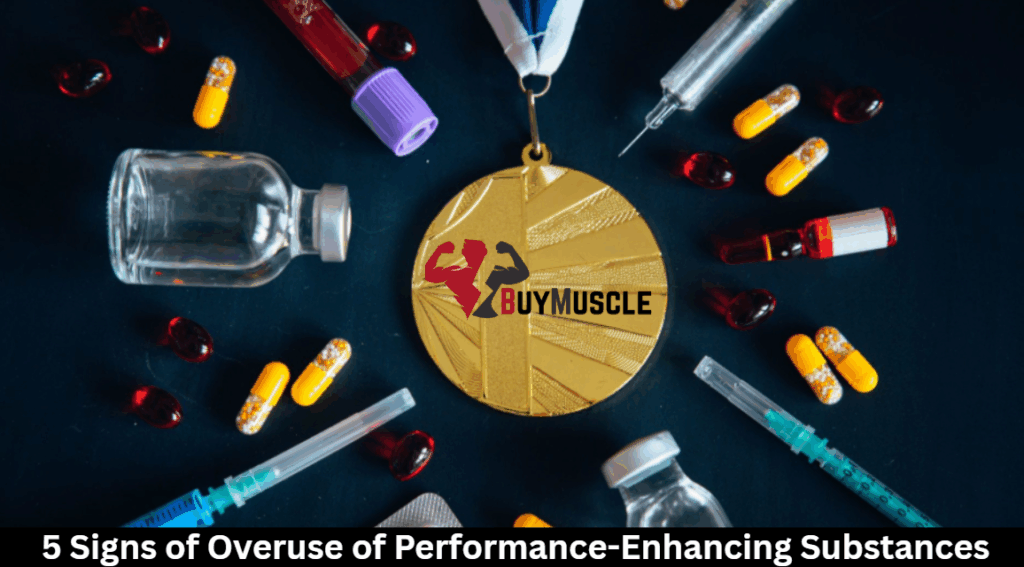Rapid, uneven muscle growth, sudden acne breakouts, and hair loss are all signs that someone is using too many performance-enhancing drugs. You might have mood swings, feel more aggressive, and have trouble sleeping. Keep an eye out for strange recovery patterns, like chronic fatigue even after getting enough sleep, and health problems like a fast heart rate and hormonal imbalances.
A lot of users stop socializing and change their identities to focus only on training. These warning signs often show up in small ways before turning into big problems.
Rapid and Dramatic Physical Changes
Some physical changes happen naturally when you train consistently. Still, if your muscles grow too quickly or your body composition changes too dramatically, it may be a sign that you’re using too many performance-enhancing drugs. You might see changes in your body happen faster than they should because of your training program.
Check for uneven growth, which means that some muscle groups grow more than others. Other signs that something is wrong are sudden acne breakouts, skin that is too oily, or unexplained hair loss. These quick and big changes in your body aren’t just skin-deep; they show that something is wrong inside that could be very bad for your health.
If you notice joint pain or swelling that isn’t normal, pay attention to it. Don’t ignore the warning signs your body is sending you. They could mean that your hormones are out of whack and you need to fix it right away.

Behavioral and Mood Fluctuations
While physical changes may be the most obvious signs of using too many performance-enhancing drugs, the mental effects can be just as scary and disruptive. You might have mood swings that go from happy to sad without any clear reason. These swings can happen quickly and without warning.
These drugs can change the chemistry of your brain a lot, which can cause big changes in your behavior that friends and family usually notice first. Look out for more aggression, irritability, or impatience in situations that usually don’t bother you. You might have trouble sleeping, have racing thoughts, or feel anxious in a way you didn’t before.
Don’t think that changes in your mental state have anything to do with your supplements. These shifts in your mood often signal hormonal imbalances and require a doctor’s evaluation right away.

Uncommon Patterns of Training Recovery
Many people think that proper recovery is the key to athletic progress, which is why unusual recovery patterns are often a sign of drug abuse that improves performance. You might notice that you’re always tired, even on days off, or that your muscles stay sore for a long time, even though you eat and sleep well.
When your training suddenly stops making progress, that’s another red flag. If you’ve been getting better steadily but suddenly can’t make any progress even though you’re putting in more effort, your body may be dealing with stress from drugs. If you feel fine during workouts but can’t seem to bounce back afterward, something’s wrong. Pay attention to the difference between how hard you think you’re working and how well you’re actually recovering.
These unusual recovery patterns show that your body’s systems are overloaded, which could be because performance enhancers are putting too much stress on your body’s natural healing abilities.

Emerging Health Complications
Long-term use of performance-enhancing drugs can cause a number of health problems that can show up out of the blue, in addition to the immediate physical changes. As your heart gets more stressed, you might notice that your resting heart rate keeps going up. It could lead to arrhythmias or high blood pressure that lasts even on days when you’re not working out.
A subtle hormonal imbalance can develop, affecting systems throughout your body. Men may have less interest in sex and problems getting pregnant, while women may have deeper voices and periods that don’t happen on time. These problems are a sign that your endocrine system is having trouble keeping things in balance.
Your body sends you warning signs when you feel tired for no reason, have trouble sleeping, or have strange digestive problems. Don’t ignore these symptoms that seem unrelated; they are often signs that your body is reacting to chemicals that are messing with its normal processes.
Social Withdrawal and Changes in Identity
The psychological effects of performance-enhancing drugs often show up in your social life long before you realize it yourself. You might hear friends and family talk about how you haven’t been around as much at gatherings or how your personality has changed in ways you didn’t notice.
Mood swings from using drugs or alcohol usually drive this withdrawal. When your emotions change suddenly, you are less likely to want to be around other people. As you spend more time on training and managing your substance use, your sense of self becomes more limited.
The cycle is similar to how people get addicted: being alone makes them more dependent on drugs, which makes them feel even more alone. If your conversations always focus on training milestones and body composition instead of a wide range of interests, it’s a sign that you need to do something about it before your relationships suffer permanent damage.
Frequently Asked Questions
How long will it take for side effects to go away after you stop using it?
Some side effects will go away in a few weeks, while others may take months. Most of the time, hormone levels go back to normal in three to six months. However, some effects, like damage to the heart, may last forever or take longer to heal.
Can genetic testing tell us what specific things put people at risk for using drugs too much?
Yes, genetic testing can tell you what your specific risk factors are for having bad reactions to performance-enhancing drugs. Your genes affect how you break down these substances and how likely you are to have side effects.
Do natural supplements cause the same warning signs?
No, natural supplements usually don’t cause the same warning signs. You won’t often have hormonal imbalances, stress on your organs, or mood swings that are aggressive, like you do with performance-enhancing drugs, but some may have mild side effects.
How do performance enhancers affect prescription drugs?
Performance enhancers can interact with your prescription drugs in dangerous ways, like raising your blood pressure, hurting your liver, and making your drugs less effective. You should talk to your doctor before mixing these things.
What do blood tests show that someone is using performance enhancers?
Hormone panels (testosterone/estrogen), liver enzymes, cholesterol profiles, blood cell counts, and certain steroid metabolite tests are all blood tests that can show that someone is using performance enhancers. Substance use will often change these markers a lot.







